The 2020 Browser Battle: Surfing With Speed
by Brett Howse on September 10, 2020 8:00 AM EST- Posted in
- Software
- Browsers
- Mozilla
- Google Chrome
- Microsoft Edge
Scripting Performance
As websites have gotten more and more complex, the browser’s scripting performance has continued to be extremely important. To quantitatively analyze this performance, we turn to several web-based scripting tests. The specific tests we normally leverage are being expanded to include a wider variety of workloads to get a better handle on how each browser can handle them. And, just for fun, we are including some incredibly old scripting tests just to show why they are not used any longer.
As far as hardware we are turning to the Microsoft Surface Laptop 3, featuring the Intel Core i7-1065G7 which is based on Intel’s 10 nm Ice Lake platform. It is set to run in its maximum performance mode during these tests to give the CPU its maximum boost.
WebXPRT 3
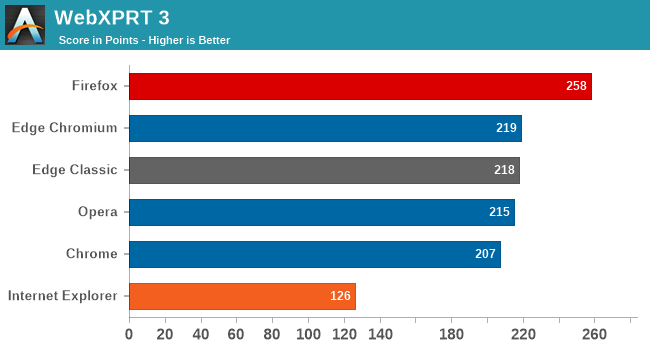
Rather than focus on a specific function, Principled Tehcnologies developed WebXPRT to simulate several real-world tasks with HTML5 and JavaScript, including photo enhancement, OCR scanning, AI, and more. If you would like to delve into how this benchmark works, and how the score is calculated, check out the report on WebXPRT as well as scoring.
In this first test, Firefox is the clear winner, easily outclassing all of the Chromium browsers which are all within a few points of each other. Interestingly, classic Edge and new Edge are almost tied. Internet Explorer does not fare as well.
Speedometer 2.0
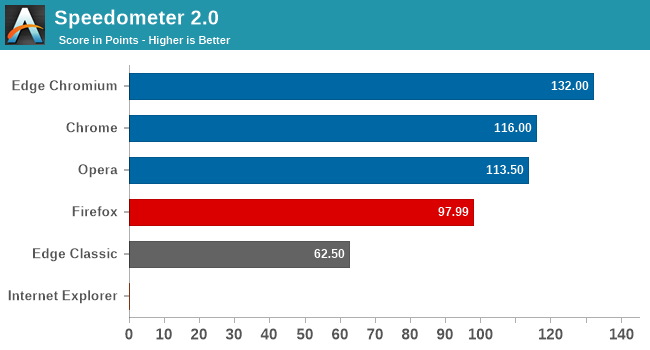
Created by Apple’s WebKit team, Speedometer 2.0 is a relatively simple test which involves adding, completing, and removing items in a to-do list. Speedometer 2.0 was created to measure the browser responsiveness. The test performs the to-do tasks with some of the most popular JavaScript frameworks available, and the score is a geometric mean of the different implementations of the to-do app, and then an arithmetic mean of the geometric means for each iteration. Apple warns against comparing the scores of different browser engines as they will do different work, which is why we use the same browser in hardware reviews.
For this test with different browsers, the scores are actually fairly similar for most browsers, although classic Edge and Internet Explorer both do poorly, with the latter not even loading the page. Interestingly, Chromium Edge does outperform the other Chromium browsers by a few points here.
JetStream 2
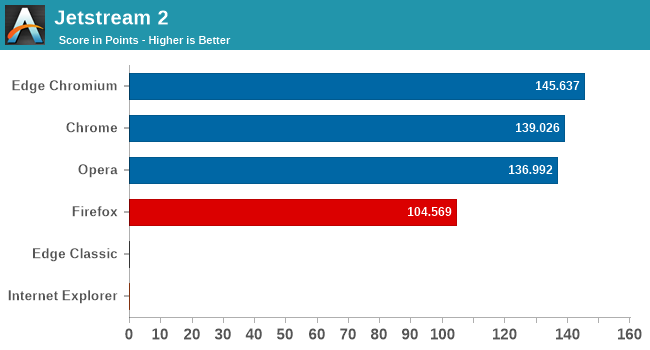
Combining JavaScript and Web Assembly benchmarks, and featuring 64 subtests, JetStream 2 includes part of some older popular scripting tests such as SunSpider and Octane 2, and each benchmark is weighed equally in the results with a geometric mean over each individual benchmark score to provide the final JetStream 2 score.
Again, we see Microsoft’s Chromium Edge slightly edge (pun intended) the other Chromium browsers. Mozilla Firefox is not quite as fast here as the Chromium browsers, and classic Edge and Internet Explorer both failed to load the test at all.
Octane 2.0
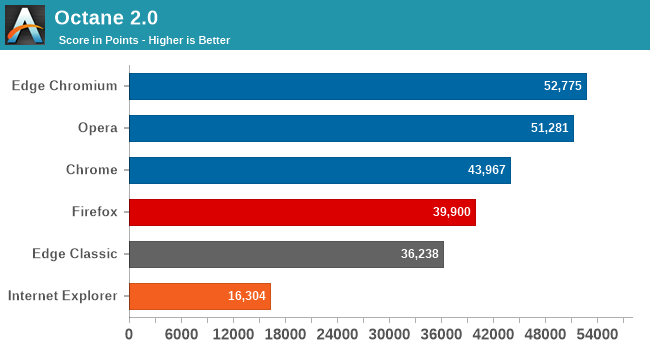
The original Octane was released in 2012, and the later Octane 2.0 was one of the most popular scripting performance benchmarks around. It focused on peak scripting performance, and as is the case, over time browser scripting engines had optimized their code to solve many of the bottlenecks that Octane was originally designed to put a spotlight on, and as such, the benchmark was retired by Google in 2017. New bottlenecks that were not being represented in Octane were common in popular sites, and this is a typical scenario with all benchmarks, but the web moves at a rapid pace.
Here we see some wide variation in results, with Chromium Edge again at the top of the stack, followed closely by Opera, and of course both are based on Chromium, but Google Chrome was not as performant on this test. All of the Chromium browsers did outperform all other browser though, with Firefox slightly behind Chrome here. Classic Edge was a bit further back, and of course Internet Explorer with its very outdated scripting engine was far behind the rest, although at least this test did run in IE 11.
Kraken 1.1
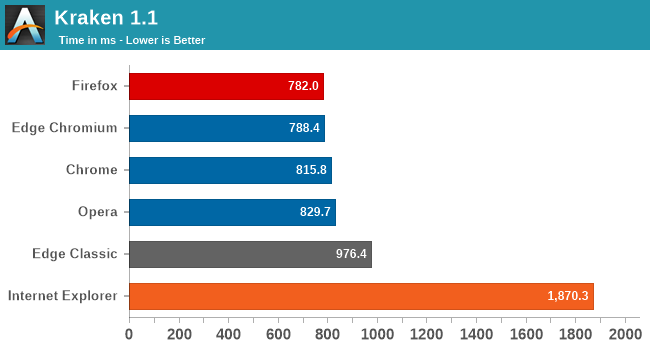
Created by Mozilla, Kraken runs several test cases from real-world applications and libraries, and includes 14 subtests. Results are reported in milliseconds to complete the tests, and as it is time-based, lower results are better.
Mozilla Firefox is our fastest browser in this test, although only by a hair. Again we see Microsoft’s implementation of Chromium Edge outperform the other Chromium browsers, although all of them are in the same range of results. Classic Edge takes a definite step back in performance here, and Internet Explorer trails the pack by a wide margin.
SunSpider 1.0.2
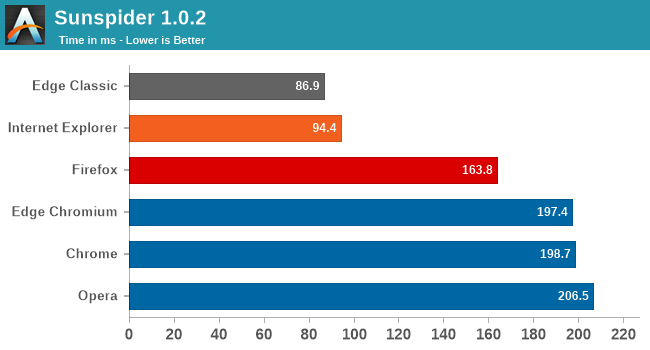
The last version of SunSpider was 1.0.2. Once this was likely the most popular scripting test around, and likely due to that, developers optimized their code to quickly overcome this test, and then found ways to work around it. SunSpider was retired and is no longer a relevant test, but since it is not too difficult to run, it was added just to see how modern browsers perform on it.
Interestingly Internet Explorer, and the newer browser based off of its code, classic Edge using EdgeHTML, both perform suspiciously high on this now retired benchmark. Whether that is due to Microsoft’s Chakra scripting engine still containing “optimizations” for SunSpider is somewhat irrelevant, as not only has the benchmark been retired, but both Internet Explorer and classic Edge are both also defunct as well.
Summary
With so many browser makers now using Chromium as their base, and contributing to its code, it should not be a huge surprise to see the Chromium browsers offering the highest scores here. Firefox does very well though, only a couple of points behind. Classic Edge, which has not been developed for over a year, is still quite compatible, but poor Internet Explorer is way behind the rest.











121 Comments
View All Comments
skavi - Thursday, September 10, 2020 - link
Thanks for making this! I'd love to see Safari included next time.casperes1996 - Thursday, September 10, 2020 - link
Whenever Big Sur is released I'd love a Mac version of this with the new Safari in the mix - It's one of basically 3 unique browsers left, and on my 2020 iMac it was faster than Chrome in every single test as well as using fewer system resources, and on my MacBook, gives better battery life with light usageOreoCookie - Thursday, September 10, 2020 - link
I was so excited to read this article — until I realized the author was going to exclude Safari. Given that there are three browser engines of relevance these days, Chromium, Gecko and WebKit, excluding the one that is in the #2 spot (since it is on all iOS devices) makes this article worth much less.Brett Howse - Friday, September 11, 2020 - link
It's tough to include Safari in an article where I want to see how Microsoft's move from EdgeHTML to Chromium went, when Safari is only on the Mac.OreoCookie - Saturday, September 12, 2020 - link
Why is that tough, I think it is really easy? Just use a Mac, install Boot Camp on it and make it dual boot Windows. You then have a perfectly fair way to test all browsers natively. It'd also be interesting to see if there are any speed differences between the OSes. And since you are not benchmarking hardware, any Mac will do.Lord of the Bored - Sunday, September 13, 2020 - link
Because the underlying OS is a factor. You simply can't compare Safari on OSX to Edge on WinX. It is a meaningless metric.Hell, you can't even compare Chromium Edge on WinX to Old Edge on a diffrent WinX service pack.
OreoCookie - Monday, September 14, 2020 - link
Chrome and Edge run perfectly fine on my Mac. So you could account for differences in the OS.casperes1996 - Sunday, September 13, 2020 - link
Understandable, and with the focus on Edge going Chromium for this article that's a sensible choice. - But for a future article with the focus shifted more onto the nature of what is essentially a three horse race in the browser space, I'd love to see some numbers behind Safari's impressive speed and battery life, though comparatively lacking feature setOreoCookie - Sunday, September 13, 2020 - link
Regarding feature set, AFAIK the main reason for Safari “lagging behind” is security and that Apple and Google have fundamentally different opinions about how HTML5 should evolve. Google is prioritizing features that allow for richer web apps. But these features could become liabilities as far as privacy and security is concerned. And they could become battery life hogs. And Apple thinks native apps are better than web apps, and making HTML5 into an app platform would be worse for HTML5 and the consumers.Personally, I agree with Apple here, I hate web apps and apps that are mere HTML wrappers. The user experience is very lackluster and performance nowhere near as good. Websites that could be super simple already require me to download megabytes to view read an article that is a few kB in size.
Independently on how you feel about that, a browser review that leaves out the #2 engine seems like it is missing the mark.
asmian - Thursday, September 10, 2020 - link
It would have been interesting to see some significant and by now completely different forked versions like Pale Moon included to see how the debloating of Firefox code and a different rendering engine affects results.